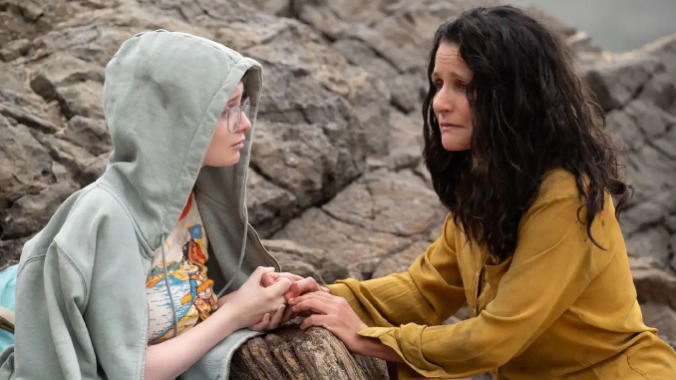Tuesday Is All Beak and No Bite

It’s hard to outright hate Tuesday, the first feature from writer/director Daina O. Pusić. There’s an admirable quality to how left of center it continuously veers throughout its (admittedly taxing) 111-minute runtime, the least preposterous aspect being the shape-shifting CGI macaw—symbolizing death incarnate—that guides most of the dramatic arc. Yet the film’s confounding tonal discordance, salvaged only in spurts by a commendable performance from Julia Louis-Dreyfus, makes its observations far more embarrassing than existential.
Louis-Dreyfus plays Zora, an American living in the U.K. with her British-born daughter, Tuesday (Lola Petticrew). While the circumstances for Zora’s residence abroad are never expanded upon—likely the result of partnering with Tuesday’s father, who is no longer in the picture—she is left to navigate mounting medical costs as her daughter physically degenerates from a terminal illness. As opposed to savoring every second left with Tuesday, Zora creates a chasm of distance between herself and her daughter, unable to cope with the reality of her diagnosis. She hires a home care aide, Nurse Billie (Leah Harvey), to tend to the wheelchair-using 15-year-old’s needs and, by proxy, provide the emotional connection that an absentee mother cannot.
However, the toll of Tuesday’s illness looms large in Zora’s daily life: She is secretly no longer working, instead hocking her once-expansive art collection to make ends meet. To keep up appearances (and keep an arm’s length from Tuesday’s worsening condition), Zora leaves their charming flat each morning and returns late in the evening, divulging fabricated work drama to Tuesday while tucking her in. Disrupting this façade is the arrival of a squalid macaw who appears before Tuesday in the garden on a spring afternoon. The film’s opening reveals that this bird is, essentially, the Grim Reaper, shuffling life off of this mortal coil with a wave of his wing. When it has what appears to be a sudden panic attack, Tuesday provides comfort and gives the “filthy” creature a bath.
In exchange for the girl’s generosity, Death agrees, in an almost inhuman purr, to wait until her mother comes home before ending her life. After hours of aimlessly meandering in the park, Zora returns, only to be greeted with a stony-faced Tuesday confessing the inevitability of her demise that night. Believing this to be pessimistic backlash for her daily departures, Zora verbally reprimands her daughter for the statement. When the now-miniature macaw flies out of Tuesday’s ear canal and presents itself, the force of a mother’s rage—and denial—are presented as perhaps the only match for Death’s grave power.
To expand on specific plot details beyond this point would be a disservice to those curious enough to see the film, but know that this is only skimming the surface of Tuesday’s commitment to absurdity. To name a few particularly outlandish moments: there’s intra-species weed smoking, a rap battle, quasi-apocalyptic occurrences and a scene where Zora unexpectedly eats something vile then goes through a peculiar transformation. For a film that claims to focus on the intense and varied ways that grief can manifest, it’s somewhat understandable to try to challenge the singularity of “sadness” as the only appropriate tone for stories about death. Pusić’s film nonetheless suffers from an inconsistency in tone; it’s perfectly fine to have jokes and moments of levity while exploring this topic, but the problem with Tuesday is that scenes meant to play out as genuine read as, for lack of a better word, downright cringeworthy (for example, Tuesday’s cliched deep-breathing tips for an age-old metaphysical being).